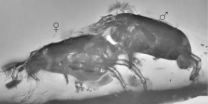(Press-News.org) A new peptide developed by researchers in Temple University's College of Science and Technology has demonstrated efficacy against triple negative breast cancer.
The leptin receptor antagonist peptide, developed by researchers Laszlo Otvos and Eva Surmacz, could become an attractive option for triple negative breast cancer treatment, especially in the obese patient population. The researchers published their findings online in the European Journal of Cancer.
According to the researchers, triple-negative breast cancers—which represent 10 percent of all mammary tumors—are characterized by the aggressive traits that is often found in younger women and have been associated with poor prognosis.
"Obesity increases the risk for triple-negative breast cancer development," said Surmacz, an associate research professor in biology at Temple. "Because triple-negative breast cancer patients are unresponsive to current targeted therapies and other treatment options are only partially effective, new pharmacological modalities are urgently needed."
Leptin, a protein that is always elevated in obese individuals and is higher in women than in men, can act locally within the body and promote cancer development by inducing the survival and growth of tumor cells, counteracting the effects of cancer therapies, and promoting metastasis. Previous studies by Surmacz suggested that leptin levels are significantly higher in aggressive breast tumors than in normal breast tissue.
In their study, the researchers examined if the leptin receptor was a viable target for the treatment of this type of cancer. It has been shown that in human triple negative breast cancer tissues, the leptin receptor was expressed in 92 percent and leptin in 86 percent of cases.
Using a mouse model of triple negative breast cancer, they tested the new leptin receptor antagonist peptide and compared it to conventional chemotherapy. The leptin receptor antagonist peptide extended the average survival time by 80 percent, compared to 21 percent for chemotherapy. The peptide was found to be non-toxic even up to the highest dose administered, said Sumacz.
"If this peptide, with its advantageous administration route and safety profile, can be developed as a drug it could be a useful addition to the existing oncology drug repertoire against various forms of cancer, including breast, brain, prostate and colon cancers," said Sumacz.
###
The study was partially funded by the Pennsylvania Department of Health.
Otvos and Surmacz are inventors on an international patent application covering this peptide and analogues for the treatment of various cancers, arthritis and autoimmune disease forms. The patent is owned by Temple University. Start-up Peptherx, Inc has an exclusive option to negotiate a license to these compounds from Temple University. Peptherx, Inc is a therapeutic peptide company focused on designing, screening, and developing synthetic peptide modulators of adipokine signaling for the treatment of cancer, inflammatory/autoimmune and metabolic diseases.
Copies of this study are available to working journalists and may be obtained by contacting Preston M. Moretz in Temple's Office of University Communications at pmoretz@temple.edu.
New peptide could be effective treatment for triple negative breast cancer
Obese population more at risk for this type of cancer
2011-03-01
ELSE PRESS RELEASES FROM THIS DATE:
Development team achieves 1 terabit per second data rate on a single integrated photonic chip
2011-03-01
WASHINGTON, Feb. 28—With worldwide Internet data traffic increasing by 50 percent each year, telecommunications companies that handle this digital torrent must be able to economically expand the capacities of their networks while also adapting to new, more-efficient data-handling technologies. Over the last decade, a development team at Infinera Corp. in Sunnyvale, Calif. has pioneered the design and manufacture of photonic integrated circuits (PICs) aimed at meeting that need. This technology has enabled the team to achieve a record one trillion bits per second (1 Terabit/s) ...
Researchers develop curious snapshot of powerful retinal pigment and its partners
2011-03-01
BETHESDA, Md., Feb. 28, 2011 – Science fiction novelist and scholar Issac Asimov once said, "The most exciting phrase to hear in science, the one that heralds new discoveries, is not 'Eureka!' but 'That's funny.' " This recently rang true for an international team of researchers when they observed something they did not expect.
In a Journal of Biological Chemistry "Paper of the Week," the Berlin-based team reports that it has uncovered surprising new details about a key protein-protein interaction in the retina that contributes to the exquisite sensitivity of vision. ...
Full bladder, better decisions? Controlling your bladder decreases impulsive choices
2011-03-01
What should you do when you really, REALLY have to "go"? Make important life decisions, maybe. Controlling your bladder makes you better at controlling yourself when making decisions about your future, too, according to a study to be published in Psychological Science, a journal of the Association for Psychological Science.
Sexual excitement, hunger, thirst—psychological scientists have found that activation of just one of these bodily desires can actually make people want other, seemingly unrelated, rewards more. Take, for example, a man who finds himself searching ...
MIT-- parts of brain can switch functions
2011-03-01
Cambridge, MASS- When your brain encounters sensory stimuli, such as the scent of your morning coffee or the sound of a honking car, that input gets shuttled to the appropriate brain region for analysis. The coffee aroma goes to the olfactory cortex, while sounds are processed in the auditory cortex.
That division of labor suggests that the brain's structure follows a predetermined, genetic blueprint. However, evidence is mounting that brain regions can take over functions they were not genetically destined to perform. In a landmark 1996 study of people blinded early ...
Gut bacteria can control organ functions
2011-03-01
Bacteria in the human gut may not just be helping digest food but also could be exerting some level of control over the metabolic functions of other organs, like the liver, according to research published this week in the online journal mBio®. These findings offer new understanding of the symbiotic relationship between humans and their gut microbes and how changes to the microbiota can impact overall health.
"The gut microbiota enhances the host's metabolic capacity for processing nutrients and drugs and modulates the activities of multiple pathways in a variety of organ ...
Mating mites trapped in amber reveal sex role reversal
2011-03-01
ANN ARBOR, Mich.---In the mating game, some female mites are mightier than their mates, new research at the University of Michigan and the Russian Academy of Sciences suggests. The evidence comes, in part, from 40 million-year-old mating mites preserved in Baltic amber.
In a paper published March 1 in the Biological Journal of the Linnean Society, researchers Pavel Klimov and Ekaterina Sidorchuk describe an extinct mite species in which the traditional sex roles were reversed.
"In this species, it is the female who has partial or complete control of mating," said Klimov, ...
Dry lake reveals evidence of southwestern 'megadroughts'
2011-03-01
LOS ALAMOS, New Mexico, February 28, 2011—There's an old saying that if you don't like the weather in New Mexico, wait five minutes. Maybe it should be amended to 10,000 years, according to new research.
In a letter published recently in the journal Nature, Los Alamos National Laboratory researchers and an international team of scientists report that the Southwest region of the United States undergoes "megadroughts"—warmer, more arid periods lasting hundreds of years or longer. More significantly, a portion of the research indicates that an ancient period of warming may ...
Silk moth's antenna inspires new nanotech tool with applications in Alzheimer's research
2011-03-01
ANN ARBOR, Mich.---By mimicking the structure of the silk moth's antenna, University of Michigan researchers led the development of a better nanopore---a tiny tunnel-shaped tool that could advance understanding of a class of neurodegenerative diseases that includes Alzheimer's.
A paper on the work is newly published online in Nature Nanotechnology. This project is headed by Michael Mayer, an associate professor in the U-M departments of Biomedical Engineering and Chemical Engineering. Also collaborating are Jerry Yang, an associate professor at the University of California, ...
Neighborhood barbers can influence black men to seek blood-pressure treatment
2011-03-01
DALLAS – March 1, 2011 – Will Marshall saw a physician about his blood pressure at his barber's urging.
Yes, his barber.
"The barber and beauty shops for men and women are kind of their own private escapes," Mr. Marshall said. "Every conversation you can imagine goes on in the barbershop. I wouldn't have put the barbershop and blood pressure together – but that visit to my physician for my blood pressure saved my life."
Mr. Marshall now has a healthy blood pressure thanks to lifestyle and dietary changes.
He is one of about 1,300 participants in a study described ...
Researchers looking at a rare disease make breakthrough that could benefit everyone
2011-03-01
This release is available in French.
MONTREAL, March 1, 2011 – By working with Canadians of French ancestry who suffer a rare genetic disease, researchers have discovered how three genes contribute to abnormal growth, making a breakthrough that will improve our understanding of many disorders such as foetal and childhood growth retardation, abnormal development of body parts and cancer. "As a result of the Human Genome Project, we know the basic identity of essentially all the genes in the human body, but we don't automatically know what they do in detail," explained ...
LAST 30 PRESS RELEASES:
Hairdressers could be a secret weapon in tackling climate change, new research finds
Genetic risk for mental illness is far less disorder-specific than clinicians have assumed, massive Swedish study reveals
A therapeutic target that would curb the spread of coronaviruses has been identified
Modern twist on wildfire management methods found also to have a bonus feature that protects water supplies
AI enables defect-aware prediction of metal 3D-printed part quality
Miniscule fossil discovery reveals fresh clues into the evolution of the earliest-known relative of all primates
World Water Day 2026: Applied Microbiology International to hold Gender Equality and Water webinar
The unprecedented transformation in energy: The Third Energy Revolution toward carbon neutrality
Building on the far side: AI analysis suggests sturdier foundation for future lunar bases
Far-field superresolution imaging via k-space superoscillation
10 Years, 70% shift: Wastewater upgrades quietly transform river microbiomes
Why does chronic back pain make everyday sounds feel harsher? Brain imaging study points to a treatable cause
Video messaging effectiveness depends on quality of streaming experience, research shows
Introducing the “bloom” cycle, or why plants are not stupid
The Lancet Oncology: Breast cancer remains the most common cancer among women worldwide, with annual cases expected to reach over 3.5 million by 2050
Improve education and transitional support for autistic people to prevent death by suicide, say experts
GLP-1 drugs like Ozempic could cut risk of major heart complications after heart attack, study finds
Study finds Earth may have twice as many vertebrate species as previously thought
NYU Langone orthopedic surgeons present latest clinical findings and research at AAOS 2026
New journal highlights how artificial intelligence can help solve global environmental crises
Study identifies three diverging global AI pathways shaping the future of technology and governance
Machine learning advances non targeted detection of environmental pollutants
ACP advises all adults 75 or older get a protein subunit RSV vaccine
New study finds earliest evidence of big land predators hunting plant-eaters
Newer groundwater associated with higher risk of Parkinson’s disease
New study identifies growth hormone receptor as possible target to improve lung cancer treatment
Routine helps children adjust to school, but harsh parenting may undo benefits
IEEE honors Pitt’s Fang Peng with medal in power engineering
SwRI and the NPSS Consortium release new version of NPSS® software with improved functionality
Study identifies molecular cause of taste loss after COVID
[Press-News.org] New peptide could be effective treatment for triple negative breast cancerObese population more at risk for this type of cancer


